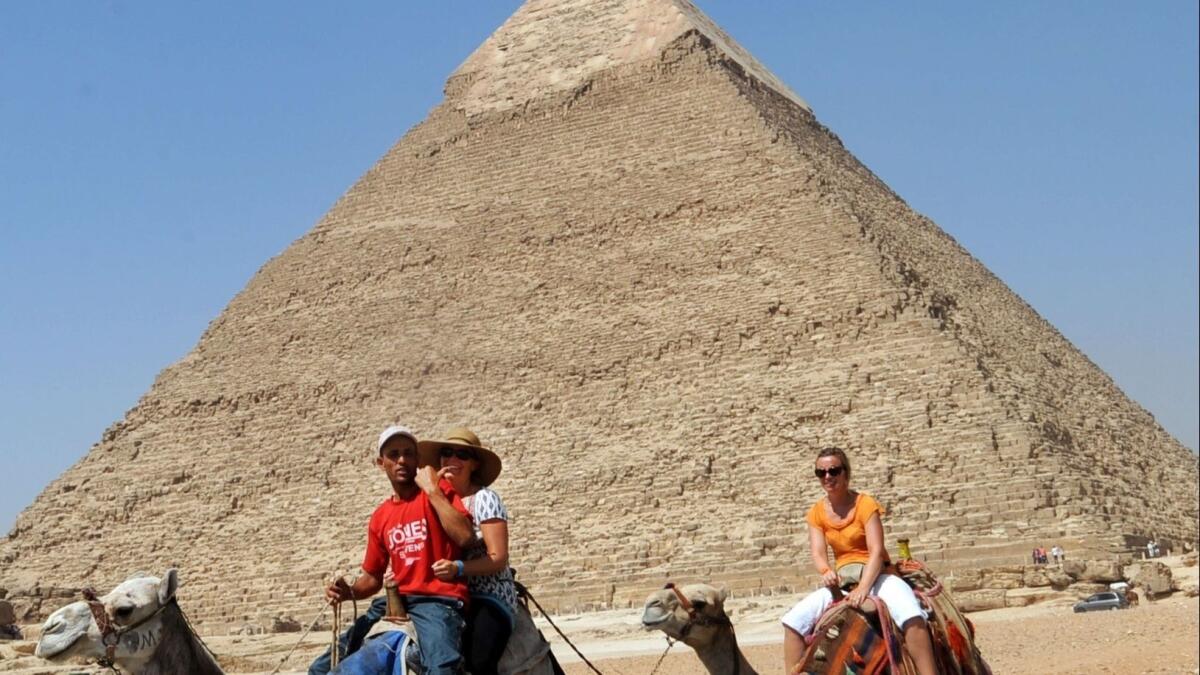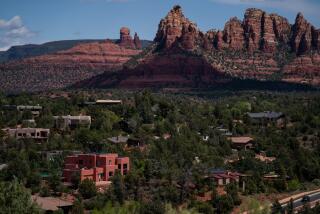Egypt revives long-stalled effort to renovate pyramids as tourism rebounds

- Share via
Reporting from Cairo — Pushy locals hawking camel rides and souvenirs have long been part of the Giza pyramids experience.
But it wasn’t until recent years that conditions became so desperate that visitors approaching by taxi were advised to roll up the windows and lock the doors to keep overeager touts from jumping in the backseat.
As tourism evaporated after political turmoil erupted in Egypt in 2011, perhaps nothing symbolized the chaos and hardship like the scene at the pyramids, icons of Egypt’s rich past that developed a reputation as a decidedly unpleasant tourist attraction. Those who still dared to make the pilgrimage found themselves so incessantly harassed that some began settling for viewing the world’s only remaining ancient wonder of seven from the second floor of a nearby Pizza Hut.
Now, with tourism finally staging a comeback thanks to an improved security situation and bargain prices — arrivals are up 50% over last year — Egypt is pushing forward on an ambitious renovation to the Giza Plateau, which houses the Sphinx and the three pharaonic pyramids including the Great Pyramid of Khufu, a marvel of human engineering that was built around 2560 BC.
A military-owned company is said to be overseeing a $23-million project, which calls for a new visitors center, a state-of-the-art security system and a fleet of electric buses to ferry visitors to and from the nearby Grand Egyptian Museum — itself a massive, $1-billion project (paid for largely with Japanese bank loans) that’s been under construction for nearly 20 years.
A decade-long effort to renovate the site of the pyramids had halted abruptly after the 2011 political revolution as tourism revenue across Egypt plunged. Members of Egypt’s new government said in 2016 that work had resumed, overseen by Queen, a security and hospitality services company with ties to the armed forces. Officials have said they will contract with private companies to maintain, secure and clean the area, an idea that has been mostly applauded by archaeologists and tourism operators, many of whom have lost faith in the state’s ability to run the site.
“They will do a better job,” said former antiquities minister Zahi Hawass, who has long criticized the Giza Plateau as an “open zoo” filled with garbage and free-roaming, unlicensed vendors and pack animals. “You cannot experience the magic of the pyramids when someone is bothering you to buy a scarf.”
Details about the companies have not been forthcoming, however, and the project — like the museum — has been delayed repeatedly. In a January article, the website Egyptian Streets observed that though officials had promised the multimillion-dollar improvements by the end of 2016, the site was still “unsafe, unclean, and confusing” and lacked even basic long-promised improvements like ATMs and trash cans.
In recent decades, the creeping urban sprawl of modern Cairo began encroaching on the ancient majesty of the pyramids, which had long stood isolated in the desert. UNESCO named the Giza pyramids a World Heritage Site in 1979, but in subsequent years they were threatened by illegal construction and rapidly expanding neighboring slums in what is now known as the Haram (“Pyramids”) District, vehicle pollution and unfettered tourism, Hawass argued in a 2000 academic journal article.
On national holidays, thousands could be found playing soccer at the pyramids and climbing on the ancient structures, wrote Hawass, who helped spearhead the construction of a fence around the site in 2008.
“The pyramids should be for the people — but they’re like a dish of gold, and instead of cleaning and taking care of it, they” defiled it, added Hawass, who starred in a reality TV series on the History Channel before the Arab Spring uprising, when he was pushed out amid accusations of corruption and publicity-seeking.
Security at the Giza pyramids is lax compared with Rome’s Colosseum or Jerusalem’s Western Wall, where visitors’ movements are tightly controlled. And no fence was high enough to keep out impoverished salespeople in search of tourist dollars.
A record $12.5 billion from tourism flowed into Egypt’s economy in 2010 — more than a tenth of its gross domestic product. Some high-end tour operators wistfully recall the days when they had to pre-book camel rides for groups. “There was actually a shortage of sellers,” says Karim El Minabawy of Cairo-based Emeco Travel. “Then the situation was reversed.”
Western visitors stayed away from cultural sites across Egypt during two years of political unrest followed by a string of scary headlines: In 2015, security forces mistakenly killed a dozen mostly Mexican tourists picnicking in the desert; a few months later, terrorists bombed a Russian airline shortly after taking off from a Red Sea resort.
Online travel message boards about the Giza pyramids were filled with disturbing descriptions of emaciated, abused animals and aggressive vendors, a few of whom physically accosted visitors who declined to cooperate.
“It was mayhem,” said Monica Hanna, an Egyptian archaeologist turned activist after the revolution, when she started a social media group to combat the widespread looting of priceless antiquities that went on virtually unchecked starting in 2011.
Hanna cites conservation efforts of historic sites in Italy and elsewhere that were paid for through public-private partnerships that could possibly serve as a model for Egypt. Such arrangements are increasingly common among governments from San Francisco to Cambodia.
In a recent interview in his office near the Great Pyramid, Director General of the Giza Plateau Ashraf Mohi said the project — despite a paucity of visible progress — was “95% done.”
Conditions at the site have improved since last year with the long-awaited tourism rebound, though promised amenities have mostly not materialized, including a souvenir bazaar and a “riding zoo” for horses and camels.
On a recent morning, vendors at the pyramids wore shiny new ID badges as they sought to corral tourists. Authorities also recently imposed stiff new fines on overzealous touts. “If there is any complaint, we will take the guy straight to prison,” Mohi said.
But Hanna said such measures won’t solve a larger problem, which is that ordinary Egyptians think of antiquities and museums as state-owned properties that are off-limits.
“Unfortunately the government’s priority for the last 30 years has been to cater to tourists rather than the local community,” she said, noting that hundreds of books exist in English about the history of the pyramids, but only a few in Arabic.
“How can we expect people to value their cultural heritage when we have done nothing to teach them about it?”
Scheier is a special correspondent.
More to Read
Sign up for Essential California
The most important California stories and recommendations in your inbox every morning.
You may occasionally receive promotional content from the Los Angeles Times.










